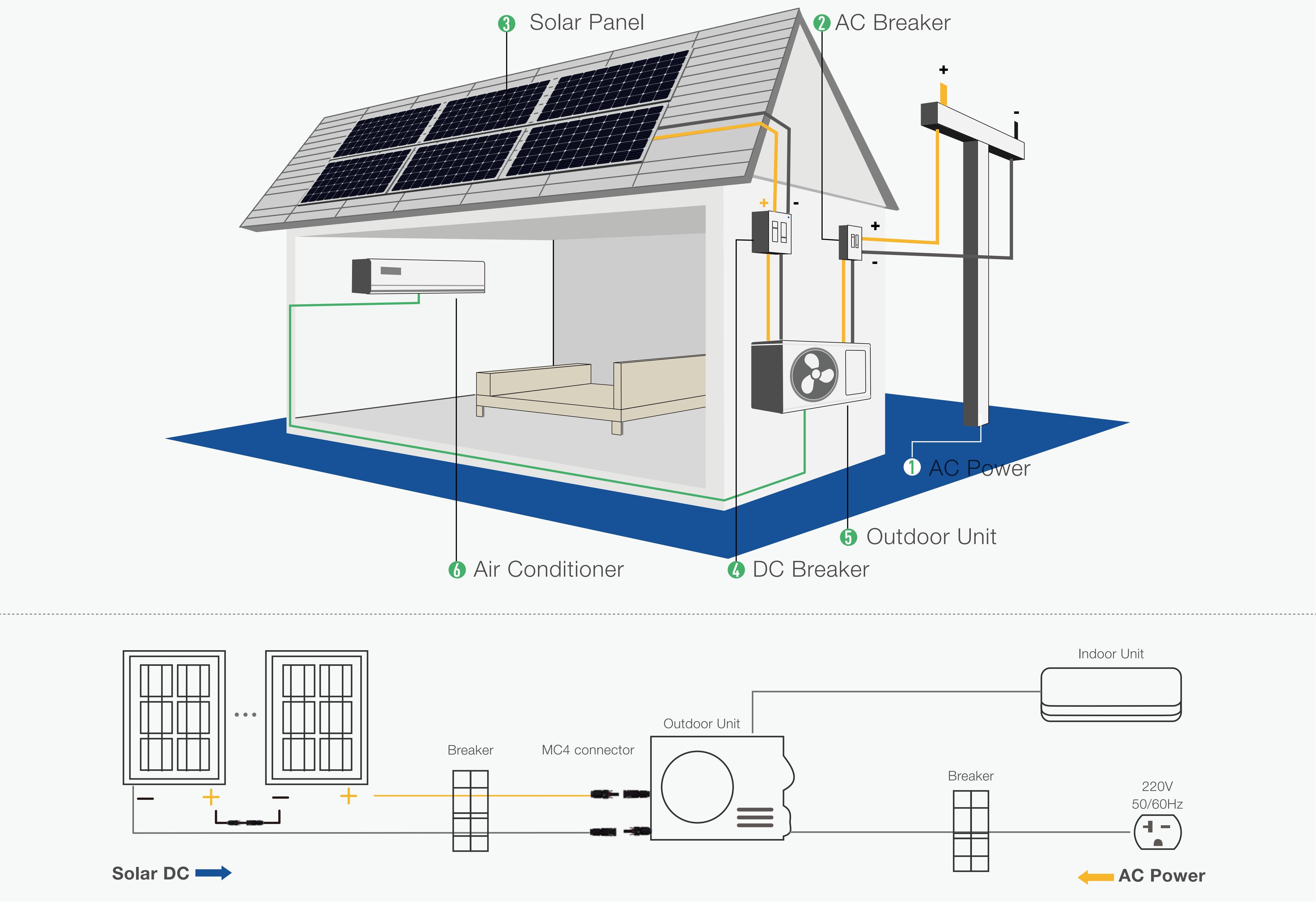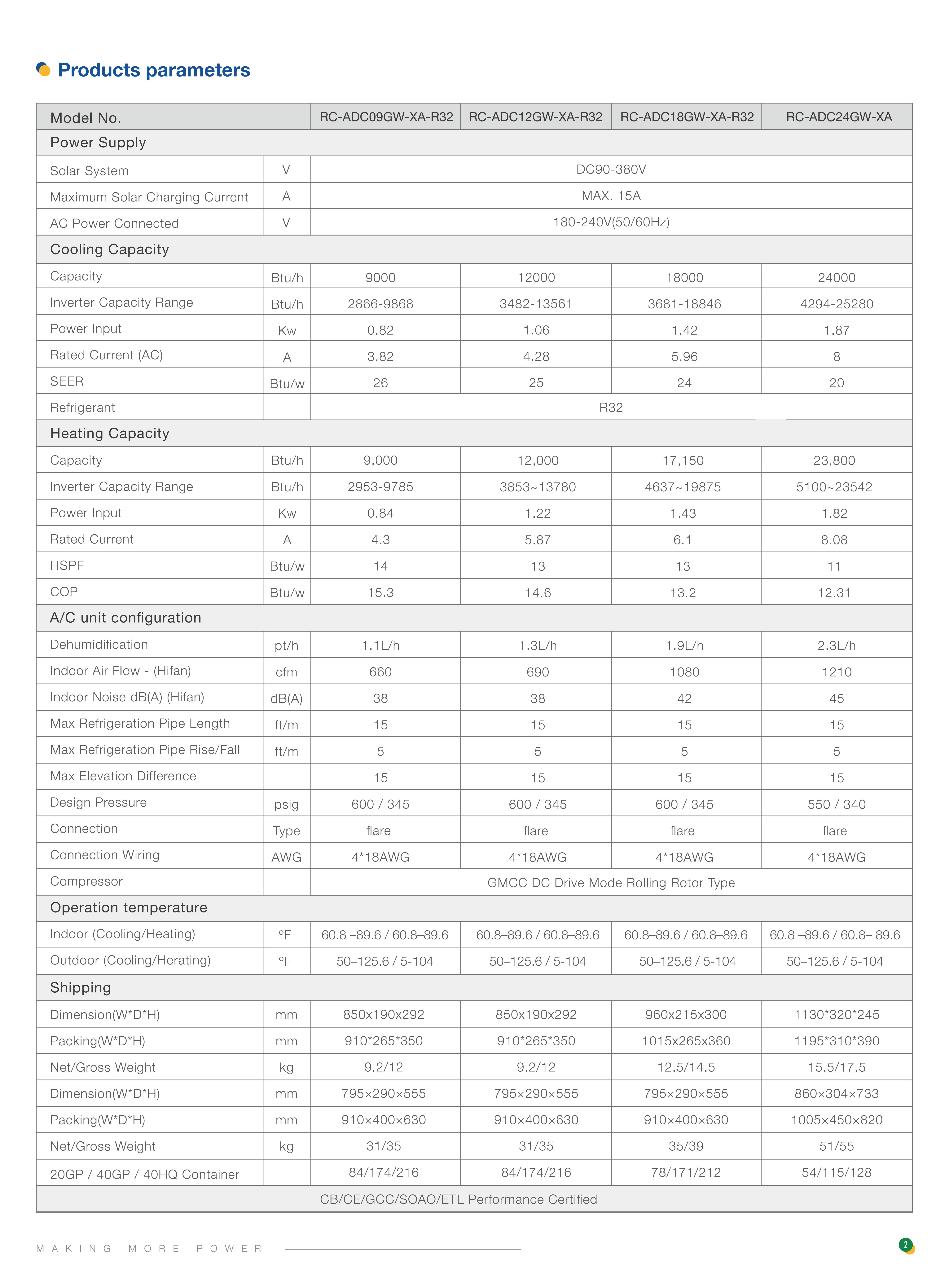"Solar air conditioner" typically refers to an air conditioning system that utilizes solar energy to power its operation, reducing reliance on conventional electricity sources and potentially offering cost savings and environmental benefits. These systems often integrate solar panels to capture sunlight and convert it into electricity to run the air conditioning unit. Solar air conditioners are becoming increasingly popular as renewable energy technologies advance and as concerns about energy costs and environmental impact grow. They are particularly attractive for locations with abundant sunlight and high cooling demands.
Solar panel voltage:
DC90-380VMaximum Solar Charging Current:
15AAC Power Connected:
180-240V(50/60Hz)Refrigerant:
R32Compressor:
GMCC DC Drive Mode Rolling Rotor TypeConnection:
Flare
The advantages of solar air conditioners include:
Reduced Electricity Costs: Solar air conditioners utilize sunlight as a free and renewable energy source, which can significantly reduce or eliminate electricity bills associated with cooling.
Environmentally Friendly: Solar air conditioners produce clean energy, reducing greenhouse gas emissions and helping combat climate change compared to traditional air conditioning systems powered by fossil fuels.
Energy Independence: Solar air conditioners can operate independently of the grid, making them ideal for remote or off-grid locations where access to traditional electricity may be limited or costly.
Lower Operating Costs: Once installed, solar air conditioners have lower operating costs compared to conventional systems since they rely on free solar energy rather than purchased electricity.
Long-Term Savings: Although the initial investment for a solar air conditioner may be higher than traditional systems, over time, the savings on electricity bills can offset the initial costs, resulting in long-term financial benefits.
Increased Property Value: Installing solar energy systems, including solar air conditioners, can increase the resale value of a property, as buyers are often attracted to homes with energy-efficient features.
Reliability: Solar air conditioners typically have fewer moving parts than conventional systems, resulting in reduced maintenance requirements and potentially increased reliability and longevity.
Quiet Operation: Many solar air conditioning systems operate quietly, enhancing comfort levels within the home or building.
Modularity and Scalability: Solar air conditioning systems can be designed to be modular and scalable, allowing for easy expansion or adjustment based on changing needs or energy requirements.
Government Incentives: In many regions, governments offer incentives, rebates, or tax credits for installing solar energy systems, including solar air conditioners, further reducing the initial investment cost.
Overall, solar air conditioners offer numerous advantages, including cost savings, environmental benefits, energy independence, and long-term sustainability.

As of my last update in January 2022, the trend of solar air conditioners was generally on the rise due to several factors:
Advancements in Solar Technology: Continuous advancements in solar panel efficiency, energy storage systems, and overall solar technology have made solar air conditioners more practical and cost-effective.
Growing Environmental Awareness: With increasing concerns about climate change and the environmental impact of traditional energy sources, there has been a growing interest in renewable energy solutions like solar air conditioners.
Government Incentives and Policies: Many governments around the world are implementing policies and offering incentives to promote the adoption of renewable energy technologies, including solar air conditioners. These incentives can include tax credits, rebates, feed-in tariffs, and other financial incentives.
Energy Efficiency Regulations: Energy efficiency regulations and standards for buildings and appliances are becoming stricter in many regions. Solar air conditioners, being more energy-efficient than conventional systems, are well-positioned to meet these requirements.
Cost Reductions: The cost of solar panels and related components has been decreasing steadily over the years, making solar air conditioners more affordable and accessible to a wider range of consumers.
Technological Innovation: Ongoing research and development efforts have led to technological innovations in solar air conditioning systems, improving their performance, reliability, and overall efficiency.
Increased Demand for Off-Grid Solutions: In regions with unreliable or expensive grid electricity, there is a growing demand for off-grid solutions such as solar air conditioners. These systems provide reliable cooling without the need for connection to the traditional power grid.
Overall, the trend for solar air conditioners is expected to continue growing as technology improves, costs decrease, and environmental awareness increases. However, market trends can vary depending on factors such as government policies, economic conditions, and regional energy infrastructure.

A solar air conditioner has several advantages compared to traditional air conditioners:
Energy Efficiency: Solar air conditioners utilize clean and renewable solar energy to power their operation. This significantly reduces reliance on electricity from the grid and helps to lower energy consumption and environmental impact.
Cost Savings: By harnessing solar power, you can reduce your electricity bills, especially during peak usage periods or in areas with high electricity rates. The savings can be substantial over the lifetime of the system.
Environmentally Friendly: Solar air conditioners produce zero greenhouse gas emissions when generating electricity from sunlight. This helps combat climate change and reduces air pollution compared to conventional air conditioners that rely on fossil fuels.
Independence from the Grid: With a solar air conditioner, you can achieve energy independence by generating your electricity onsite. This can be particularly advantageous in remote areas where grid access is limited or unreliable.
Durability and Longevity: Solar air conditioners are designed with high-quality components and often have longer lifespans compared to conventional air conditioners. They are built to withstand environmental conditions, ensuring reliable and efficient cooling for an extended period.
Quiet Operation: Solar air conditioners tend to have quieter operation due to the absence of noisy compressors and fans found in traditional air conditioners. This can contribute to a more peaceful and comfortable living environment.
Decreased Carbon Footprint: By utilizing solar power instead of relying solely on electricity from the grid, solar air conditioners help to reduce carbon emissions and mitigate climate change impacts. This contributes to a more sustainable future.
It's important to note that the specific advantages and features of a solar air conditioner can vary depending on the model, capacity, and design. It's advisable to research different products and consult with experts to understand the specific benefits and suitability for your needs.
FAQs:
Q1: Do you support OEM/ODM?
A:Definitely, OEM&ODM service is supported with a certain quantity,including customize logo,package and label;
Q2: What's the production time?
A: The production time is normally 15 working days. but we will always prepare some stocks for popular models.
Q3: Can you provide DDP service?
A:Yes, if you are a personal customer and don't want to deal with the customs, we can provide DDP service to your address.
Q4: What about the warranty and how to claim?
A: Warranty period are 5 years since you receive the product, our professional after-sales team will deal with all warranty issues.